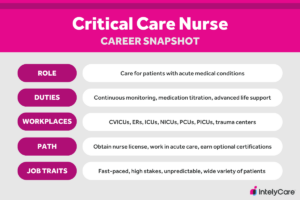Is Critical Care Nursing Right for You?

Critical care is a dynamic, demanding, and rewarding field that requires split-second decision-making and precise skills. Similar to the fast-paced environment of an emergency unit, critical care nursing involves taking care of patients with acute medical conditions. From wounds to heart attacks to neurological issues — you’ll see it all in this specialty, which ranks among the happiest jobs for nurses.
If you’re considering joining the ranks of critical care nurses, this article is your go-to resource. We’ll provide an in-depth overview of this vital nursing specialty, helping you to decide whether it’s the right fit for you.
What Is Critical Care Nursing?
Critical care is a specialized field dedicated to providing immediate care to patients dealing with life-threatening medical conditions, such as severe cardiac issues, respiratory distress, neurological crises, and exacerbation of chronic diseases.
You can think of critical care units (CCUs) as a frontline for patients in severe distress, requiring constant monitoring, intervention, and support. Here, nurses usually handle just one or two patients, and this low patient-to-staff ratio gives them the chance for more focused care and quick response to any changes in the patient’s condition.
Working in critical care is undeniably challenging. The high acuity of patients, the need for constant vigilance, and the fast-paced environment contribute to the difficulty of the job. The unpredictability and severity of the patient’s conditions make critical care nursing one of the most demanding yet rewarding areas within the nursing profession.
What Does a Critical Care Nurse Do?
In addition to performing standard nursing tasks like head-to-toe assessments and administering medications, what is a CCU nurse responsible for? Here are some examples:
- Continuous monitoring to detect subtle changes in a patient’s condition
- Ventilator management for patients who require respiratory support
- Hemodynamic monitoring, such as cardiac output and blood pressure
- Medication titration based on the dynamic needs of critically ill patients
- Complex wound care or managing surgical incisions that require specialized care
- Comprehensive assessments that encompass multiple organ systems.
- Providing advanced life support such as cardiopulmonary resuscitation (CPR), defibrillation, and emergency interventions when needed.
- Ethical decision-making and facilitating communication between healthcare providers, patients, and families regarding complex issues such as end-of-life discussions and considerations for organ donation
For more insight into critical care nursing skills and duties, check out this sample resume for a critical care nurse.
Who Would Your Typical Patient Be?
In the world of critical care nursing, the term “typical patient” doesn’t exist. Unlike other nursing specialties, you’ll deal with a wide spectrum of patients in the CCU, each presenting unique challenges and medical complexities. Here are some examples:
- Trauma victims: Patients with severe injuries from accidents, falls, or other traumatic events
- Cardiac emergencies: Patients experiencing acute cardiac events, such as heart attacks or severe arrhythmias, are commonly admitted to critical care units
- Respiratory distress cases: Individuals facing respiratory distress due to conditions like acute respiratory distress syndrome (ARDS) or severe pneumonia
- Neurological crises: Patients with neurological emergencies, including those with traumatic brain injuries, strokes, or seizures
- Sepsis and systemic infections: Patients battling severe infections leading to sepsis
- Post-surgical care: Patients recovering from complex surgeries or organ transplants
- Chronic disease exacerbation: Patients with chronic diseases, such as congestive heart failure, chronic obstructive pulmonary disease (COPD), or diabetes who experience exacerbations
Where Would You Work as a CCU Nurse?
Critical care nurses can work in a range of healthcare settings where critically ill patients require specialized and intensive care. Here are some examples:
- Intensive care units (ICUs)
- Cardiovascular ICUs (CVICUs)
- Neonatal ICUs (NICUs)
- Pediatric ICUs (PICUs)
- Emergency departments
- Progressive care units
- Trauma centers
- Post-anesthesia care units (PACUs)
- Flight nursing and transport teams
- Specialized care units
How to Become a Critical Care Nurse
Working in this field involves specific steps, including meeting educational requirements and gaining relevant experience. Here is a general guide with four steps to become a critical care nurse:
1. Earn a Nursing Degree
Obtain a nursing degree from an accredited nursing program. This can be an associate degree in nursing (ADN) or a bachelor of science in nursing (BSN) degree. Note that some critical care roles may prefer candidates with a BSN, so plan your education accordingly.
2. Obtain Licensure
Your next step is to obtain licensure as a registered nurse (RN). This involves passing the National Council Licensure Examination for registered nurses (NCLEX-RN).
3. Gain Clinical Experience
Acquire hands-on experience in acute care settings. Many hospital units offer critical care internships or residency programs for new nurses. Work in areas such as ICUs or emergency departments to develop the skills necessary for handling critically ill patients.
4. Pursue Specialty Certification
Consider obtaining a CCRN certification from the American Association of Critical-Care Nurses (AACN), or TNCC certification through the Trauma Nursing Core Course. Additionally, pursue continuing education to stay informed about the latest advancements in nursing practices and technologies.
The Pros and Cons of Critical Care Nursing
Being a critical care nurse comes with its own set of unique challenges and rewards. Here are some pros and cons associated with this profession.
Pros of Being a Critical Care Nurse
- Making a significant difference in patients’ lives by providing life-saving care during critical moments.
- Working with a varied patient population, from trauma victims to those with complex medical conditions, enriching your nursing experience.
- Developing advanced clinical skills and specialized knowledge for managing critical medical conditions.
- Being exposed to cutting-edge medical technologies and advancements, fostering continuous professional development.
- Receiving competitive compensation reflecting the advanced skills and responsibilities involved.
- Enjoying job security and knowing that your profession will be in high demand.
Cons of Being a Critical Care Nurse
- Dealing with critically ill patients and witnessing their suffering can be emotionally challenging.
- Fast-paced and high-stakes environment can contribute to high stress levels.
- Your work may involve long hours, overnight shifts, and constant standing, potentially leading to fatigue and burnout over time.
- Facing complex ethical and medical decisions, especially in situations involving end-of-life care, which can be emotionally and mentally taxing.
- Being constantly on the go, with limited time to build deep connections with patients.
- Your work schedule may be unpredictable, making it challenging to maintain a healthy work-life balance.
How Much Do Critical Care Nurses Make?
While the Bureau of Labor Statistics doesn’t report on the average critical care nurse salary in the U.S., it lists the annual average RN salary in general and surgical hospitals at $101,100; the average annual RN salary in outpatient care centers is $107,650 each year. Your salary can vary based on several factors, including your years of experience, the type of facility you work in, your certifications, and geographical location.
The states with the highest salaries for RNs are:
Is There a High Demand for Critical Care Nurses?
Approximately 6 million deaths occur annually due to trauma. Additionally, cardiovascular disease, cancer, and diabetes collectively contribute to 71% of global deaths. Whether you’d care for a trauma patient or a stroke survivor, the importance of critical care nursing is evident — these patients need the expertise of skilled nurses.
Looking ahead, the employment of RNs, including CCU nurses, is expected to grow by 6% in the next decade, with an average projection of 194,500 job openings each year.
Ready to Start a Critical Care Nursing Career?
Ready to start applying? Let us help you discover the best-fitting job. Sign up today for personalized nursing job alerts from IntelyCare delivered straight to your inbox.



